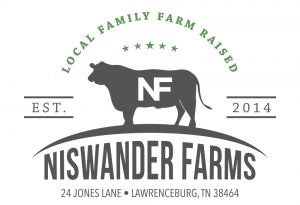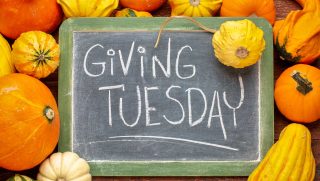“If you don’t love it, you’ll leave it.”
It’s a saying that embodies agriculture, an industry that requires hard work, flexibility, knowledge of machinery and technology, and optimism. One of Matt Niswander’s neighbors told him that as the twentysomething was in the early stages of farming. Matt didn’t grow up knowing much about farming, but after just a few years running his own operation in Tennessee, he’s come to know it intimately.
“There are so many dynamics to farming that it makes it so easy to just lay it down and walk away,” Matt said.
This first-generation farmer, however, has no intention of walking the easy path.
Matt was raised in Lawrenceburg, a city of nearly 15,000 people in an otherwise rural area of Tennessee. He had no family in farming and no background in the industry, save for a short stint in high school when he worked on a dairy farm to earn some weekend spending money.
It was there that he got his first exposure to agriculture, setting the stage for a future in agvocacy, even if he still had a few years and several life changes ahead of him before arriving at this point. They included getting married at the age of 19 to Colbie, graduating from college as a registered nurse at the age of 21, and soon thereafter getting a master’s degree as a nurse practitioner, not to mention having kids.
At one point, he knew someone who was selling a 300-acre farm, but he also had a good handle on what a dollar meant. Simply put, a $1 million investment isn’t exactly in the budget of a new college graduate.
“One of the biggest struggles for a first-generation farmer is that initial capital,” he said.
Matt’s nursing job at a local family medical practice coupled with Colbie’s income allowed them to ultimately save the seed money needed to purchase a 70-acre farm. That was 2014. It would take another two years for the blank slate of the property — situated amid rolling hills and valleys (you’d be best to call them “hollers,” thank you very much) — to be readied to begin a cow-calf operation and for him to purchase his first animal.
“All my friends think I’m crazy. All my family thinks I’m crazy,” said Matt, who was “supposed” to end up living in a city or along the river after college. “They can’t believe Niswander Farms is actually on the sign as you pull into the driveway.”
Of course, it didn’t happen overnight.
“When I bought my farm in 2014, I couldn’t even drive a tractor. I didn’t know how to do anything with the equipment at all,” Matt said.
Farming is highly technological industry, from the tractors to the combines to the sprayers. There’s an app for almost everything, and farmers are constantly using the technology that other industries use to make themselves more efficient and better stewards of the land of their resources.
“We’re way past the Farmers’ Almanac,” Matt noted.
He was going to need help getting his feet under him, and, luckily, there were support programs out there.
Farm Credit’s beginning farmer program was crucial to helping Matt and his family understand the aspects of a viable business plan; American Farm Bureau’s Young Farmers & Ranchers Program helped him build a support network and find mentors; and Tennessee’s Agricultural Enhancement Program had an in-depth class on everything involving raising livestock, from growing the grass to giving shots. Matt gobbled up every sliver of knowledge he could.
“You can’t start out huge, especially when you have no family to back you up in terms of farm knowledge or equipment or land management,” Matt said. “So, you have to find your niche, and if you’re a first-generation farmer, you have to be creative.”
While the typical cow-calf operation was his way to enter the industry, he has since shifted gears and now sells meat directly to the public.

What makes Matt a particularly special case in the agricultural sector isn’t that he successfully got his operation up and running (which, of course, he did), but that he’s channeled that calling into an agvocacy platform that has taken him in front of politicians and the members of the public, as well as sending him to New York City, Washington, D.C., and across the pond to several European nations.
“I want people like me who sat in a subdivision and dreamed of being a farmer, with no way to know how to do it, to be able to get into the industry,” he said.
Matt and his family keep an open door to discussing their experiences of starting a farm — a fluid conversation that allows people to engage agriculture in ways they may not be used to. Matt notes that he spent much of his life solely on the consumer side, and now being on the production side, he is in a unique position to speak with authority and passion from both perspectives and to help bridge the gaps between everyone involved.
“I can relate to people who don’t understand agriculture. I can help to educate about the misperceptions in the industry,” he said.
He has a better understanding of what’s on food labels and where they may try to steer buyers wrong. He also understands the impacts of news reports about the EPA or USDA in ways that he never did before, not taking the reporting at face value. There’s an opportunity for education and improved information here, and he’s taken that crusade to the masses and up the ladder.
“It’s one thing to farm and to learn all of that from scratch, but it’s another to go and talk to somebody else as a recognized ‘expert’ in your field and be a voice for agriculture,” he said.
Matt has a radio show, is active on social media, and has presented before the Tennessee General Assembly. For example, everyone is affected by groundwater regulations or trade regulations — farmers moreso that the general public. Getting his voice out there helps to support fellow farmers and improve the livelihood of the industry.
“Farming is about regulation, it’s about global trade, it’s about labor and workforce,” Matt explained. “You can have the skills to be a great farmer, but without appropriate responsible regulations, you can’t be a farmer at all. …
“I want the true message of agriculture to get out, so that when someone goes to buy your products, it’s a truth that’s spoken on that label or that sign you may be reading. For any regulation that’s passed in Washington, I want a voice. There’s people who can farm all day long — they can do the best crops or the best cattle — but they don’t know how to go to Washington or they’re afraid to go to Washington,” he said.
Recently, Matt was one of just 10 people in the U.S. selected part of Partners in Advocacy Leadership, a two-year program that involves advocating and learning about ag. In March, a 12-day trip with the PAL program took him as far away as Europe, where he met with ag ambassadors and learned about the impact of Brexit on agriculture and other global aspects of the industry.
Growing out of these experiences is a deeper appreciation for people’s connection to the land, from the large-scale, high-tech farms to the backyard farmers who bring different ideas into the ag space. Everyone working in agriculture or who has a passion for agriculture is taking responsibility for where their food comes from and for how we can move forward as a whole. Matt appreciates that, he embraces that.
“I love seeing people get involved. I don’t care what walk of life you come from and what you do for a 9-to-5 job,” he said. “I see people wanting to be connected to their food.”
Ryan Tipps is the managing editor for AGDAILY. He has covered farming since 2011, and his writing has been honored by state- and national-level agricultural organizations.



